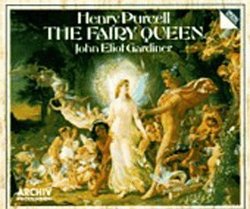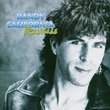| All Artists: Henry Purcell, John Eliot Gardiner, Eiddwen Harrhy, Elisabeth Priday, English Baroque Soloists, Judith Nelson, Jennifer Smith, Timothy Penrose, Ashley Stafford, Wynford Evans, Martyn Hill, David Thomas Title: Purcell: The Fairy Queen / Harrhy, Nelson, Priday, Smith, Thomas, Varcoe, Gardiner Members Wishing: 0 Total Copies: 0 Label: Archiv Produktion Release Date: 10/25/1990 Genres: Pop, Classical Styles: Vocal Pop, Opera & Classical Vocal, Forms & Genres, Theatrical, Incidental & Program Music, Historical Periods, Baroque (c.1600-1750) Number of Discs: 2 SwapaCD Credits: 2 UPC: 028941922120 |
Search - Henry Purcell, John Eliot Gardiner, Eiddwen Harrhy :: Purcell: The Fairy Queen / Harrhy, Nelson, Priday, Smith, Thomas, Varcoe, Gardiner
 | Henry Purcell, John Eliot Gardiner, Eiddwen Harrhy Purcell: The Fairy Queen / Harrhy, Nelson, Priday, Smith, Thomas, Varcoe, Gardiner Genres: Pop, Classical
This 1981 recording was the first period-instrument version of Purcell's most famous "semi-opera." This Restoration-era hybrid was a play with a complete (spoken) script plus numerous musical numbers for soloists, choru... more » |
Larger Image |
CD DetailsSynopsis
Amazon.com essential recording This 1981 recording was the first period-instrument version of Purcell's most famous "semi-opera." This Restoration-era hybrid was a play with a complete (spoken) script plus numerous musical numbers for soloists, chorus, and pit orchestra. The Fairy Queen is based on Shakespeare's A Midsummer Night's Dream, although you'd never know it from the music, which has (typically for the genre) no real connection to the plot. (Most of the songs and dances are masques performed for the entertainment of Titania, Oberon, or Hippolytus.) The advantage to this is that Purcell's score can be performed fairly well on its own. The Fairy Queen includes some of Purcell's best-loved comic scenes ("The Drunken Poet" and "Coridon and Mopsa") and songs ("Hark the echoing Air," "Ye gentle spirits," and "Hark how all things in one sound rejoice"--the last sung here by Jennifer Smith, sounding more beautiful than on any recording she's made since). Other highlights include the "Masque of the Four Seasons" and an allegory wherein Night, Mystery, Secrecy, and Sleep appear to sing Titania to her rest. Standouts from a solid cast include sweet-voiced, nimble soprano Judith Nelson and baritone Stephen Varcoe, whose solos as Winter and as Night are breathtaking. --Matthew Westphal Similar CDs
|
CD ReviewsI loved this music... 12/11/2000 (5 out of 5 stars) "Well, a few years ago I heard some excerpts from Purcell's Fairy Queen and instantly fell in love. This is one of the most underrated masterpieces of all time. Gardiner's direction is good, and the soloists are all great. However, I do have a small reservation about this recording. Although Gardiner is known for conducting at fast tempos, a couple of the arias from this recording struck me as not being fast enough. In any case, you won't be disappointed though, with Jennifer Smith's gorgeous coloratura and Archiv's digital sound, I could listen to "Thus the ever grateful spring" and "Hark how all things" all day. And, of course, Eiddwen Harrhy gives us an extremely beautiful (but somewhat lacking in dramatic effect) "Hark now the echoing air."" As beautiful as a summer moon Jacques COULARDEAU | OLLIERGUES France | 08/05/2002 (5 out of 5 stars) "In this semi-opera, Henry Purcell brings the new English era after the Puritan Commonwealth to an ever more complete fullness. He goes back to Shakespeare to get his story and transforms it into a prodigy of beauty. He sure changes a few things. It is no longer the pure song of the beauty of love, but the clear hymn of the beauty of marriage. Hymen comes on to celebrate the victory of constant and faithful matrimony, based on love for sure, but not governed by it. The fairies and their queen are no longer pure sprites springing out from the woods and forests, but they lead us to a new garden of Eden, represented by the richness of a Chinese garden, the three weddings and the six spouses being represented by six vases containing six orangetrees, a full promise of fruitful unions. Shakespeare has been christianised and all the fairy tale has become civilised. We may consider that Shakespeare is more often looking for entertainment than for moral advancement. Here we definitely are looking for the latter. We are politically and culturally digesting the puritan revolution. The second achievement of Purcell is the density of the music in the « corrected » play. We don't know who corrected it, but the songs and the music are definitely essential for the message to go through, for the show to be entertaining, for the medium to become fascinating. We are reaching here a new phase in the dramatic development of the English stage. John Eliot Gardiner who conducts this music gives it such a high level of lightness, clearness, dramatic expressivity, richness that the music transcends any distance through many centuries to reach us and sound as modern as it can, to speak to us as if we were inside the score, on the stage, taking part in the various dances and songs. He literally absorbs us into the performance. We are with thr musicians and the singers and this sensation of inclusion gives us a tremendous level of pleasure. In other words the music is never distant or cold, but always as hot as a golden potato that is there to satisfy our hunger with its nourishment. And it sure does.Dr Jacques COULARDEAU" A voice teacher and early music fan George Peabody | Planet Earth | 07/29/2007 (4 out of 5 stars) "TOO MANY COOKS SPOIL THE POT!!
'The Fairy Queen', an adaptation of Shakespeare's 'A Midsummer Night's Dream' with "Singing, Dancing and Machines interwoven, after the manner of an opera" was first performed on May 2, 1692 at the Queen's Theatre, Dorset Garden, London, possibly as a birthday tribute to Queen Mary. This score, which is only partially in Purcell's autograph, has served as the basis of the edition specially prepared by Peter Holman and John Eliot Gardiner for performance at the 1981 Gottingen Handel Festival and this subsequent recording. The surviving music that Purcell composed for the 1693 revival is here recorded complete for the first time. This recording is a huge disppointment for me because after hearing tne 1994 Nikolaus Harnoncourt disc with his line-up of very excellent soloists (7 in all) and the skilled Arnold Schoenburg Choir, I really thought that Gardiner's recording would at least be at that level, but I had to remind myself that this was early in Gardiner's wonderful sojourn, and I do think that if he did this today he would have improved on the following faults: he used 10 soloists, all of which were capable, but dramatically failures; the 3 that I thought did skilled characterizations were: Jeniifer Smith (soprano), Martyn Hill(tenor) and Stephen Varcoe (bass). The worst performers over all were Wynford Evans (very odd tonality) and the two countertenors were really lackluster and conveyed no personality whatsoever. The comic scene that is so great in this semi-opera between the two 'gay' men was so excellent in Harnoncourt's version (it was performed in that by Michael Chance and Robert Hole absolutely superbly). Timothy Penrose and David Thomas performed it like an academic exercise. It seems to me overall that Gardiner wanted to give many of his choir members an opportunity to solo, but 'too many cooks spoil the pot' and this very alive, vibrant, mostly humorous semi-opera died in many places. The Monteverdi Choir as always was excellent and the small amount of time when they were singing was (for me) the only really enjoyable listening. Of course, to that last comment I must add the English Baroque Soloists who also added to the listening pleasure. I'm not 'trashing' this disc, and if I had not already listened to the Harnoncourt and also seen the dvd of it from the English National Opera, I might have made a modified assessment. But if you are going to purchase this work, go for the Harnoncourt or 'The Sixteen' which is also very fine!!!" |

 Track Listings (31) - Disc #1
Track Listings (31) - Disc #1
